________________
5.3
raman c ra - The Code of Conduct of the Jaina Monk Dr. Dhayanand Bhargava
1.0 Jainism is an Ascetic Religion.
The moral code of Jainism preaches asceticism to its extreme. The idea is that if spirit is something beyond senses, then all sensual pleasures must be only an obstacle in the realization of the soul. They, therefore, must be renounced. Once this principle is accepted, no concession is to be made in the name of practicability. Of course, this ideal cannot be achieved normally all at once. Therefore there are gradual stages of renunciation. A person who wishes to fulfil his social obligation cannot give up all worldly activities, but gradually as one realizes the importance of spiritual attainment and gains confidence and power, he proceeds towards the higher goal, leaving aside the material necessities of life. This journey leads to monkhood.
SORS OF JAN
1.1 The Importance of Asceticism in Jainism
In the earlier scriptures of the Jainas, we find that the gospels are addressed mainly to monks. It means that Asceticism occupies the central place in Jainism. In Brahmanism on the other hand, householder occupies the central place. In later Hinduism, asceticism was accorded a place in the fourth stage of life under the rama scheme. In Jainism, ascetic character was retained from the very beginning till today. In Hinduism, also asceticism continued to occupy increasingly important place day by day. In the Mah bh rata, we find how a conflict was going on between the older religion of activity and the newer religion of renunciation. According to B had Kalpabh ya, even a r vaka is to be taught Yatidharama before r vaka dharma i.e. he is to be instructed in the life style of a monk first, so that he can know the ultimate goal of life. In Hinduism, action or karma preceded the study of jn na or Ved nta. It appears that Hinduism was very much influenced by the ascetic tendencies of Jainism and Buddhism.
1.2 Asceticism and Society
Coming to asceticism of the Jain tradition, a Jain monk has to devote himself absolutely to spiritualism. No doubt, he depends on society for such bare necessity of life as food, but he is not obliged to fulfil any social duty. In fact, his contribution to the society is not mundane but spiritual. It is true that spiritualism plays an important role in regulating the social behavior in the sense that it puts a check on the bad activities of the members of the society. Morality is the first condition for all spiritual progress and the same morality is essential for any social progress. In this way, asceticism plays a role in guiding the society but its main object is spiritual realization. It is held that perfection lies in spiritualism and not in worldly progress. In a way, worldly pleasures are a hindrance to spiritual realization and, therefore, they cannot be recommended. The scriptures of the Vedic tradition, the Gt for example appear to have a different view. They hold that worldly progress and spiritualism can go together. This is how Lokmanya Tilak interpreted Gt. However, the interpretation of the Gt by ankara has an ascetic overtone. Thus, we find that though the Vedic tradition has been wavering regarding the importance of asceticism, the Jaina tradition is firm about its conviction. The influence of Jainism on Vedic tradition can be clearly seen in the description of the life style of Ṛ the Bh gawat Pur a.
abhadeva in
2.0 Jaina Monk
The conduct of a Jaina monk is the highest example of asceticism. He is expected to practice in what he believes. Let us therefore, have a look at the code of a Jaina monk to understand how asceticism is to be put in practice. This forms a unique chapter of Indian civilization and of the history of asceticism as a whole.
2.1 Who Can Become a Monk?
A monk can practice spiritualism without any distinction of caste or colour. Harike was a Pariah who was admitted to the order of monkhood and he is referred to with highest regard even though socially Pariah was considered to be belonging to the lowest cadre of the society. The conditions laid down for a person for qualifying for initiation for monk-hood are such, which do not discriminate between person and person on the basis of cast. One must be above the age of 8, should not be too old, should be physically and mentally fit and should not have any such social obligation as debt. The
Page 327 of 556
STUDY NOTES version 4.0




